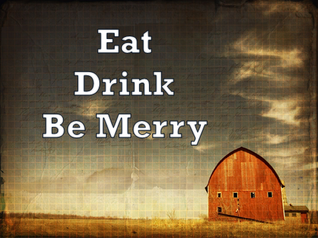
The phrase “Eat, drink and be merry” is often associated with a mind that only thinks on worldly things and avoids considering the eternal. After all, they were the last words of the Rich Fool in Luke 12:19. He was a man who was prepared for the good life of an early retirement. The only problem was that he hadn’t prepared for a far more important future. God tells him, “Fool! This night your soul is required of you, and the things you have prepared, whose will they be?”
Tragically, too many souls have followed the Rich Fool and his “eat, drink and be merry” philosophy.
But the Bible also teaches that more of us need to live with an “eat, drink and be merry” mindset. No, we don’t need to be think like the Rich Fool. Instead we need to adopt the thinking of Ecclesiastes 8:15. There Solomon declared, “So I commended pleasure, for there is nothing good for a man under the sun except to eat and to drink and to be merry, and this will stand by him in his toils throughout the days of his life which God has given him under the sun.”
In the context of Ecclesiastes, Solomon was not advocating for a life of recklessness or self-indulgence. Instead he was promoting the contented life. At the beginning of Ecclesiastes, Solomon acknowledges that he is a man who had everything this world could offer. He was the Old Testament’s version of the Rich Fool — eating, drinking, and living by any pleasure he desired. But it all led him to conclude that such a life is vanity and grabbing at the wind. As the book unfolds, Solomon provides the keys that unlock a life of meaning. Among them is a person’s ability to be content with what he can control. Namely, he can work to provide enough food and drink for himself (and his family), and he can find contentment in leading such a simple, productive life.
It is the same attitude found in Jesus’ prayer “Give us this day our daily bread.” It is also the basis of Paul’s teaching in 1 Timothy 6:8 - “If we have food and covering, with these we shall be content.”
The difference between the wise and foolish life is how we approach “eat, drink and be merry.” Too often we fail to find the contentment in Solomon’s “eat, drink and be merry” because we are too busy pursuing the Rich Fool’s “eat, drink, and be merry.” Choose wisely, be blessed, and be a blessing.
Tragically, too many souls have followed the Rich Fool and his “eat, drink and be merry” philosophy.
But the Bible also teaches that more of us need to live with an “eat, drink and be merry” mindset. No, we don’t need to be think like the Rich Fool. Instead we need to adopt the thinking of Ecclesiastes 8:15. There Solomon declared, “So I commended pleasure, for there is nothing good for a man under the sun except to eat and to drink and to be merry, and this will stand by him in his toils throughout the days of his life which God has given him under the sun.”
In the context of Ecclesiastes, Solomon was not advocating for a life of recklessness or self-indulgence. Instead he was promoting the contented life. At the beginning of Ecclesiastes, Solomon acknowledges that he is a man who had everything this world could offer. He was the Old Testament’s version of the Rich Fool — eating, drinking, and living by any pleasure he desired. But it all led him to conclude that such a life is vanity and grabbing at the wind. As the book unfolds, Solomon provides the keys that unlock a life of meaning. Among them is a person’s ability to be content with what he can control. Namely, he can work to provide enough food and drink for himself (and his family), and he can find contentment in leading such a simple, productive life.
It is the same attitude found in Jesus’ prayer “Give us this day our daily bread.” It is also the basis of Paul’s teaching in 1 Timothy 6:8 - “If we have food and covering, with these we shall be content.”
The difference between the wise and foolish life is how we approach “eat, drink and be merry.” Too often we fail to find the contentment in Solomon’s “eat, drink and be merry” because we are too busy pursuing the Rich Fool’s “eat, drink, and be merry.” Choose wisely, be blessed, and be a blessing.

 RSS Feed
RSS Feed